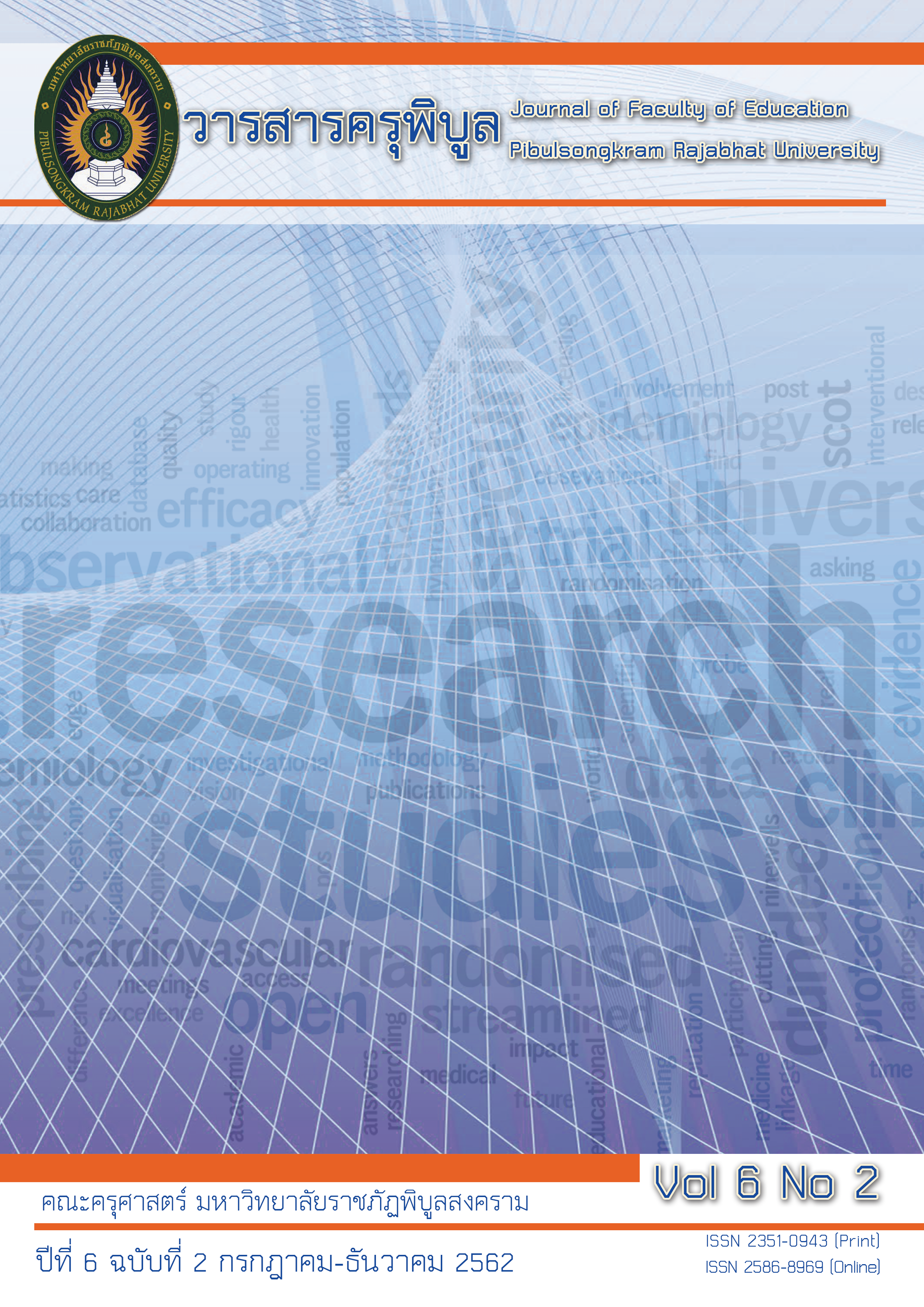The Development of Mathematics Learning Achievement of Mathayomsuksa Three Students on System of Equations by Using Learning Management in Cognitively Guided Instruction and Questioning.
Keywords:
Mathematics Learning Achievement, Cognitively Guided Instruction, QuestioningAbstract
The purposes of this research were to study mathematics learning achievement of Mathayomsuksa three students at Chomsurang Upathum School on the system of equations by using cognitively guided instruction and questioning and to study the students’ opinion toward learning through cognitively guided instruction and questioning.The sample group was 47 cognitively guided instruction and questioning in the second semester of the academic year 2017, selected via cluster random sampling from 12 classes, each providing students with a variety of academic abilities. The research instruments were 9 mathematics lesson plans on the system of equations, 10 multiple-choice test items on equations, and 2 essay questions (total score for the two types of test was 30), and a students’ opinion questionnaire toward learning equations with cognitively guided instruction and questioning. The data analysis employed percentages, means, standard deviations, and t-test, and tables and descriptions to present the findings.The research findings revealed that the students’ mathematics achievement was higher after learning with cognitively guided instruction and questioning andwas higher than the expected 60% at the statistical significance level of .05, and that almost all students agreed that the learning activities provided allowed them to think and solve problems systemically, the learning activities were appropriate for the contents, and learning activities with questions could help develop more thinking
References
ชัยวัฒน์ สุทธิรัตน์. (2553). การจัดการเรียนรู้แนวใหม่. นนทบุรี: สหมิตรพริ้นติ้ง แอนด์พับลิสซิ่ง.
ชุติมา ฉุนอิ่ม (2558) การพัฒนาการคิดเชิงคณิตศาสตร์ของนักเรียนชั้นมัธยมศึกษาปีที่ 1 โดยใช้กิจกรรมการเรียนรู้แบบสอนแนะให้รู้คิด (CGI) ร่วมกับเทคนิคการใช้คำถามของบาดแฮม
(Badham).วิทยานิพนธ์ศึกษามหาบัณฑิต สาขาวิชาวิทยาศาสตร์ศึกษา, มหาวิทยาลัยนเรศวร.
พจนา ทรัพย์สมาน. (2549). การจัดการเรียนรู้โดยให้ผู้เรียนแสวงหาและค้นพบความรู้ด้วยตนเอง. กรุงเทพฯ: จุฬาลงกรณ์มหาวิทยาลัย.
สถาบันส่งเสริมการสอนวิทยาศาสตร์และเทคโนโลยี. (2555).คู่มือวัดผล ประเมินผลคณิตศาสตร์. กรุงเทพฯ: สาขาประเมินมาตรฐาน สถาบันส่งเสริมการสอน วิทยาศาสตร์และเทคโนโลยี.
สุธารัตน์ สมรรถการ. (2556) ผลการจัดการเรียนรู้แบบการสอนแนะให้รู้คิด (CGI) เรื่อง วิธีเรียงสับเปลี่ยนและจัดหมู่ที่มีผลต่อผลสัมฤทธิ์ทางการเรียน ความสามารถในการแก้ปัญหา และความ
สามารถในการเชื่อมโยงทางคณิตศาสตร์ของนักเรียนชั้นมัธยมศึกษาปีที่ 6. ปริญญานิพนธ์การศึกษามหาบัณฑิต สาขาวิชาการมัธยมศึกษา, มหาวิทยาลัยศรีนครินทรวิโรฒ.
อำภารัตน์ ผลาวรรณ์. (2556) ผลการจัดกิจกรรมการเรียนการสอนแบบแนะให้รู้คิด (CGI) เรื่อง ความน่าจะเป็น ที่มีต่อผลสัมฤทธิ์ทางการเรียนคณิตศาสตร์ ความสามารถในการแก้ปัญหาทาง
คณิตศาสตร์ความตระหนักในการรู้คิดและความมีวินัยในตนเองของนักเรียนชั้นมัธยมศึกษาปีที่ 5. ปริญญา นิพนธ์การศึกษา มหาบัณฑิต สาขาวิชาการมัธยมศึกษา, มหาวิทยาลัย
ศรีนครินทรวิโรฒ.
Badham, V. (1994) What's the Question?. Pamphlet 23. Primary Association for Mathematics, Australia
Carpenter,T.P. et al. (1989). Using knowledge of children’s mathematics thinking in classroom teaching: An experimental study. American Educational Research Journal.
26 (4): 499– 531.
Carpenter,T.P. et al.(2000). Cognitively Guided Instruction: A Research-Based Teacher Professional Development Program for Elementary School Mathematics: Research
Report. National Center for Improving Student Learning and Achievement in Mathematics and Science.
Davison (1990) Book Reviews. Sage journals ,Volume: 23 issue: 2, page(s): 198-199
Downloads
Published
Issue
Section
License
Copyright (c) 2019 Journal of Faculty of Education Pibulsongkram Rajabhat University

This work is licensed under a Creative Commons Attribution-NonCommercial-NoDerivatives 4.0 International License.
ลิขสิทธิ์เป็นของคณะครุศาสตร์ มหาวิทยาลัยราชภัฏพิบูลสงคราม


